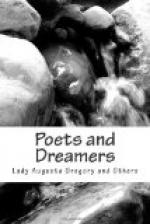Another little emigration song, very simple and charming, tells of the return of a brother from America. He finds his pretty brown sister, his ‘cailin deas donn,’ gathering rushes in a field, but she does not know him; and after they have exchanged words of greeting, he asks where her brother is, and she says ‘beyond the sea’; then he asks if she would know him again, and she says she she would surely; and he asks by what sign, and she tells of a mark on his white neck. When she finds it is her brother who is there and speaking to her, she cries out, ’Kill me on the moment,’ meaning that she is ready to die with joy.
This is the lament of a woman whose bridegroom was drowned as he was rowing the priest home, on the wedding day:—
’I am widow and maid, and I very young; did you hear my great grief, that my treasure was drowned? If I had been in the boat that day, and my hand on the rope, my word to you, O’Reilly, it is I would have saved you sorrow.
’Do you remember the day the street was full of riders, and of priests and brothers, and all talking of the wedding feast? The fiddle was there in the middle, and the harp answering to it; and twelve mannerly women to bring my love to his bed.
’But you were of those three that went across to Kilcomin, ferrying Father Peter, who was three-and-eighty years old; if you came back within a month itself, I would be well content; but is it not a pity I to be lonely, and my first love in the waves?
’I would not begrudge you, O’Reilly, to be kinsman to a king; white bright courts around you, and you lying at your ease; a quiet, well-learned lady to be settling out your pillow; but it is a great thing you to die from me when I had given you my love entirely.
’It is no wonder a broken heart to be with your father and your mother; the white-breasted mother that crooned you, and you a baby; your wedded wife, O thousand treasures, that never set out your bed; and the day you went to Trabawn, how well it failed you to come home.
’Your eyes are with the eels, and your lips with the crabs; and your two white hands under the sharp rule of the salmon. Five pounds I would give to him that would find my true love. Ohone! it is you are a sharp grief to young Mary ni-Curtain!’
Some men and women who were drowned in the river Corrib, on their way to a fair at Galway, in the year 1820, have still their names kept green in a ballad:—
’Mary Ruane, that you would stand in a fair to look at, the best-dressed woman in the place; John Cosgrave, the best a woman ever reared; your mother thought that if a hundred were drowned, your swimming would take the sway; but the boat went down, and when I got up early on Friday, I heard the keening and the clapping of women’s hands, with the women that were drowsy and tired after the night there, without doing




